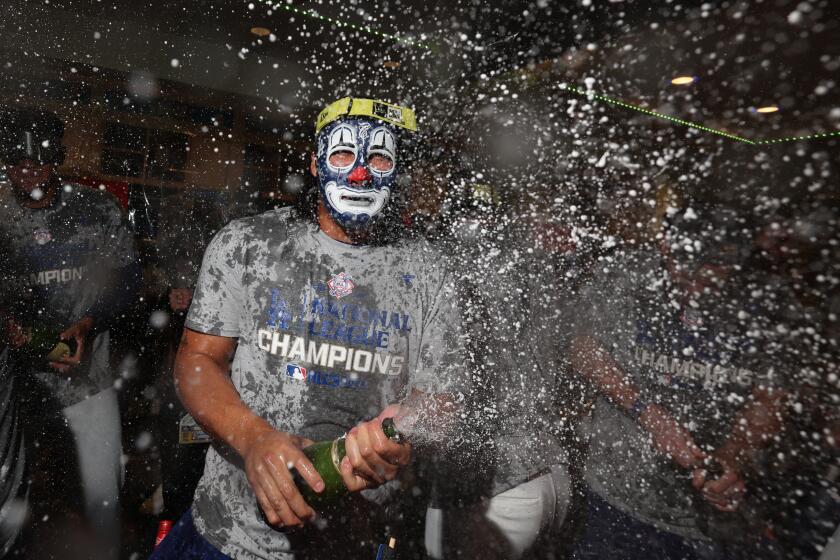Dodgers have to figure out how to replace Farhan Zaidi
Reporting from Carlsbad — In the early days of the 2017 season, a name on the transaction wire piqued the interest of Farhan Zaidi. He remembered Max Muncy from his time as a member of Oakland’s front office, and retained affection for the squat infielder’s plate discipline and simplified swing. When the Athletics released Muncy in late March, Zaidi sent him a text message, offering a minor league contract with the Dodgers.
Muncy mulled the offer for a few weeks before accepting. The Dodgers committed nearly $200 million to free agents that winter, but the player who led the team in home runs and slugging a season later emerged from Zaidi’s relentless search for organizational depth.
In four seasons as the Dodgers general manager, collaborating with president of baseball operations Andrew Friedman, Zaidi distinguished himself with a keen eye for talent on the margins. He served as an innovative voice and preached the importance of versatility, a quality upon which the Dodgers relied en route to two consecutive National League pennants.
“No move is too small,” Zaidi said Wednesday afternoon, “to not be worth a certain level of effort and detail.”
Zaidi was speaking at a news conference in San Francisco while the rest of the sport convened at a golf course outside San Diego. Less than two weeks after the World Series, the Dodgers will confront an offseason without Zaidi, who was introduced Wednesday as the president of baseball operations for the Giants. His departure to the Dodgers’ chief rival will not immediately jolt the power structure inside the National League West, not with San Francisco embarking on a sizable rebuilding effort. But his absence will rob the Dodgers of a crucial off-field asset.
Zaidi brought “creativity,” Friedman said. “Work ethic. Just the ability to connect with people. Extremely talented. Someone who has obviously made a huge impact for us in the last few years.”
The departure of Zaidi did not catch Friedman by surprise. He was made aware that San Francisco wanted to pursue Zaidi during the postseason. The Giants waited until the Dodgers were eliminated before pouncing. Zaidi interviewed in San Francisco on Friday with Giants chief executive officer Larry Baer. Zaidi informed Friedman on Tuesday he would take the job.
Now the Dodgers must determine how to replace him. Friedman indicated he had not determined if the team will need to hire a new general manager, or will operate without one. When former vice president of baseball operations Alex Anthopoulos departed the front office last winter to take over the Braves, the Dodgers did not hire an immediate replacement.
Despite re-signing Clayton Kershaw, the Dodgers still have a variety of offseason tasks ahead. The team remains in negotiations on a multi-year extension for manager Dave Roberts. The free-agent market will soon begin to hum. Friedman did not intend to rush to find a general manager.
“It’ll definitely take time,” Friedman said. “Obviously, player personnel decisions are front and center right now, and have to be. So it’s just trying to figure out, between all the various staffing things, how to prioritize.”
As general manager, Zaidi’s portfolio ranged from analytics to trade negotiations to amateur scouting. In the immediate future, his workload will be split between vice president of baseball operations Josh Byrnes, farm director Brandon Gomes and director of development and scouting Alex Slater. Byrnes was the general manager in Arizona and San Diego before joining the Dodgers in 2014, but is considered unlikely to reprise that role in Los Angeles. Friedman noted Byrnes’ comfort with a role aiding the team’s scouting apparatus and player-development machine.
“Those are two areas that are really highly functioning, performing at very high levels, that he is a big part of,” Friedman said. “So I’m not sure if that makes sense. But obviously, he’s been a big part of what we’ve done, and will continue to be.”
In the last decade, the composition of baseball front offices have adopted a new template. A team will hire one executive as a president of baseball operations, while designating an executive underneath the president as general manager. The model originated with Cleveland in 2010, when the Indians made Mark Shapiro the president of baseball operations and named Chris Antonetti the GM. It has been replicated with the Cubs, Cardinals, Athletics and Twins.
“It allows you to bring in more upper-level talent,” said David Forst, who became general manager of Oakland in 2015 when Billy Beane was promoted to executive vice president of baseball operations. “That’s why teams originally started it, so you could keep your own people. You could keep your own GM-level front office people.”
At his news conference in San Francisco, Zaidi mentioned his affinity for the Bay Area. He spent a decade with Forst and Beane in Oakland before leaving for the Dodgers. He sounded invigorated by the prospect of resuscitating the Giants, who have averaged 68.5 wins the last two seasons. Friedman stressed that the Dodgers supported Zaidi during the interview process and did not feel they could convince him to stay by increasing his salary.
“I was certainly less comfortable than I would have been [if Zaidi was interviewing for a job] in the other five divisions,” Friedman said. “But just organizationally, my own personal philosophy is it’s important to let people pursue opportunities that make sense for them and their family. This fell under that umbrella.”
It is not unprecedented for a baseball team to run without a general manager. Boston hired Dave Dombrowski to run its baseball operations department in 2015. He appointed Mike Hazen as his general manager. After Hazen left for Arizona a year later, Dombrowski eschewed naming an official replacement. He split tasks between an assistant general manager, Brian O’Halloran, plus a pair of former general managers, Allard Baird and Frank Wren, who served as senior vice presidents.
“Ultimately, I was going to make the baseball decisions, anyway,” Dombrowski said. “So we decided to go a different way.”
The Dodgers might follow that path into 2019. Friedman could not offer a definitive answer Wednesday.
“I haven’t really wrapped my arms around it,” Friedman said. “Farhan was struggling, deliberating over the weekend, and into yesterday. There was so much other stuff going on, I didn’t really start to wrap my arms around it. And now I will.”
Twitter: @McCulloughTimes
More to Read
Are you a true-blue fan?
Get our Dodgers Dugout newsletter for insights, news and much more.
You may occasionally receive promotional content from the Los Angeles Times.









